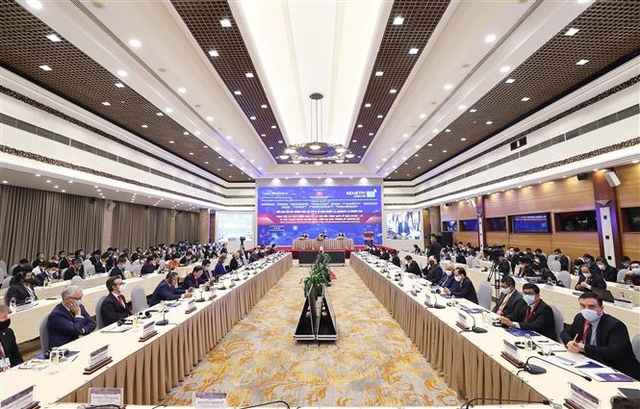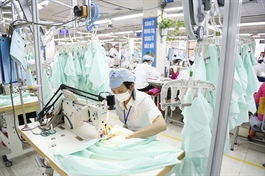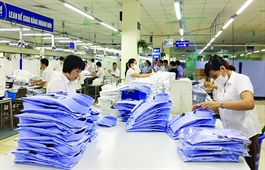Digital citizens stay core in push for digital society: PM
Digital citizens stay core in push for digital society: PM
The move, as the prime minister said, is in line with the Government's vision of putting the people at the center and as the ultimate goal in the development process.
The Government considers digital citizens a core component in the push towards digital- society and economy, in turn ensuring the country's sustainable growth in a digital age.
Prime Minister Pham Minh Chinh stressed the view at the Industry 4.0 Summit held today [December 6], discussing solutions for Vietnam’s sustainable socio-economic development in the post-pandemic period.

Prime Minister Pham Minh Chinh. Source: VNA |
According to Chinh, the pandemic has left severe consequences on the global economy, including Vietnam.
After nearly two years, Vietnam has now gradually put Covid-19 under control and proceeded to a safe and flexible adaptation to the pandemic, Chinh added, noting this is the key foundation to boost recovery.
Referring to the Omicron variant, Chinh said Vietnam has had experience in dealing with previous outbreaks and put in place plans to deal with any circumstance.
“Two months on since the shift in Covid-19 response, the socio-economic situation has shown positive improvements,” Chinh said, referring to stable macro fundamentals, inflation under control, rising FDI, and trade surplus.
“With a stable political environment and national unity, the country’s prospects remain bright going forward, despite the current temporary difficulties,” Chinh stated.
The prime minister noted the adaptation to the pandemic in the context of the digital age and globalization is an urgent issue for any country, not to mention global concerns such as climate change, aging population, depleted natural resources, or environmental pollution.
“These are global issues that require a global approach and the close cooperation between countries, regardless of development levels,” he continued.
Addressing the upcoming Covid-19 strategy and socio-economic recovery plan, Chinh said Vietnam continues to give priority to public health when taking measures against the pandemic.
Right in December, the Government would complete the vaccination program for 100% of the population aged 18 and above; provide jabs for children from 12 to 18 years old and a booster shot for the most vulnerable public.
Vietnam continues to improve the preventive health measures and treatment facilities, while gradually reopening schools, resuming international flights and trade.
In addition, Vietnam would ensure flexible management of fiscal and monetary policies to stabilize macro-fundamentals, social welfare and promote the development of strategic infrastructure, including digital ones.

Overview of the summit. |
Stay mindful of digital divide
At the summit, World Bank’s Senior Economic Adviser Mary Hallward-Driemeier pointed out the uneven application of technologies from Industry 4.0 in economic sectors, especially in labor-intensive industries, as well as the disruption of global supply chains, bottlenecks in trade, and climate change.
In this regard, the Covid-19 pandemic has been one of the catalysts in shaping the global investment trend for greater sustainability in supply chains and a major focus on R&D, marketing, and customer services.
The World Bank expert called for Vietnam to prioritize the development of both manufacturing and services sectors, with emphasis on training labor skills, promoting innovation, and encouraging small and medium enterprises (SMEs) in adopting new technologies of Industry 4.0.
Sharing the view, UNDP Resident Representative in Vietnam Caitlin Wiesen called for Vietnam to “nurture and support national export champions, especially but not solely in manufacturing.”
Wiesen said the modern industrial policy is no longer about tariffs and quotas, but instead focuses on creating opportunities for domestic firms to innovate, develop technological and managerial capacities, and penetrate new markets.
“Public investment is an important instrument, especially if strategic investment in transport, power, logistics, research, education, and training can help domestic firms lower costs and achieve greater competitiveness,” she noted.
While suggesting Vietnam is well-placed to benefit from Industry 4.0, Wiesen warned the country to be mindful of the risks of allowing the digital divide to widen, as findings from a study revealed only 4.5% of those who did their administrative services in 2020 used national and provincial e-service portals, although access to the Internet improved in most of the provinces in 2020 compared to 2019.
Amid the emergence of the new Omicron variant, Wiesen suggested the country pursue a “Triple-A Governance” – Anticipatory, Agile and Adaptive in addressing future uncertainties, including creating breakthroughs in the pursuance of a cashless society and ensuring social welfare intact.























